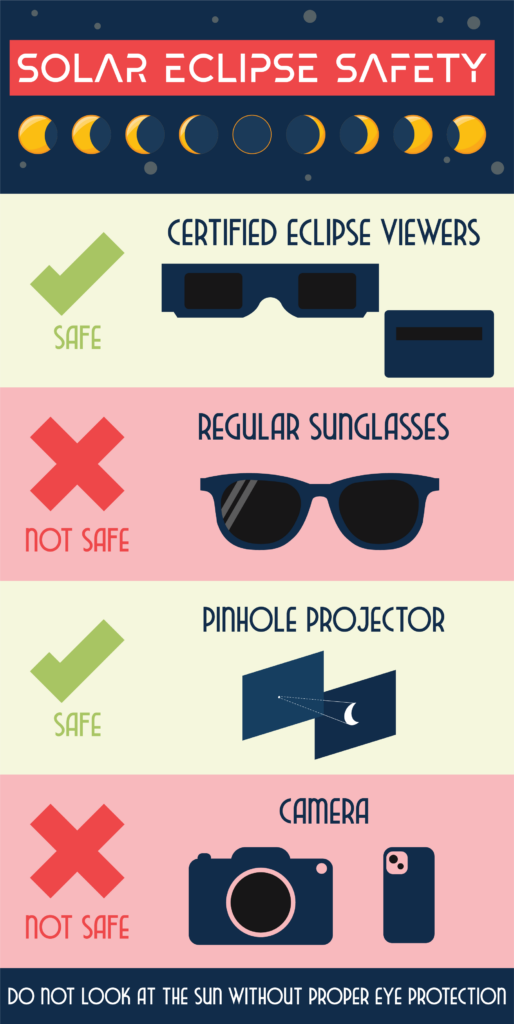How to View the Eclipse Safely
 A lot of people in North America will be lucky enough to be in the path of the total solar eclipse on April 8, and the rest of the continent will be able to experience the penumbra, or a partial eclipse. Eclipses are rare events that provide an incredible spectacle. Getting to experience an eclipse is precious, but so is your vision. When the moon crosses in front of the sun, skies will darken, stars will twinkle, and you will be treated to an astronomical show. But staring directly at an eclipse without proper eye protection will damage your eyes.
A lot of people in North America will be lucky enough to be in the path of the total solar eclipse on April 8, and the rest of the continent will be able to experience the penumbra, or a partial eclipse. Eclipses are rare events that provide an incredible spectacle. Getting to experience an eclipse is precious, but so is your vision. When the moon crosses in front of the sun, skies will darken, stars will twinkle, and you will be treated to an astronomical show. But staring directly at an eclipse without proper eye protection will damage your eyes.
The only safe way to look directly at the sun is through special-purpose solar filters, according to the American Academy of Ophthalmology. These special filters are used in eclipse glasses and hand-held solar viewers. Eclipse glasses are available for purchase at big-box stores, electronics supply outlets and online. Look for glasses that carry this certification insignia: ISO 12312-2.
Except during the brief total phase of a total solar eclipse, when the Moon completely blocks the Sun’s bright face, it is not safe to look directly at the sun without specialized eye protection for solar viewing. Viewing any part of the bright sun through a camera lens, binoculars, or a telescope without a special-purpose solar filter secured over the front of the optics will instantly cause severe eye injury.
Improper viewing of the sun during an eclipse can cause the development of eclipse blindness or retinal burns.
Click here to explore where & when to watch the eclipse.
Set Rules for Your Viewing Party
NASA outlines Dos and Don’ts of viewing the eclipse:
- Do not look directly at the sun
- Do not use homemade filters or ordinary sunglasses, even very dark sunglasses
- Use special solar filters, such as eclipse glasses or handheld solar viewers, to view the eclipse
- Read and follow filter instructions and supervise children
- In any stage of eclipse, do not look at the sun through a camera, telescope, binoculars or other optical device, and never use solar filters with these devices, as concentrated solar rays will damage them and can cause serious eye injury
- Inspect your solar filter and discard the filter if it is scratched or damaged
- Remember to wear sunscreen, a hat, and protective clothing to prevent skin damage.
Additional Resources
- American Academy of Ophthalmology
- American Astronomical Society
- NASA: Eye Safety During a Solar Eclipse
- NASA: Eclipse 101
- EarthSky
- Exploratorium
